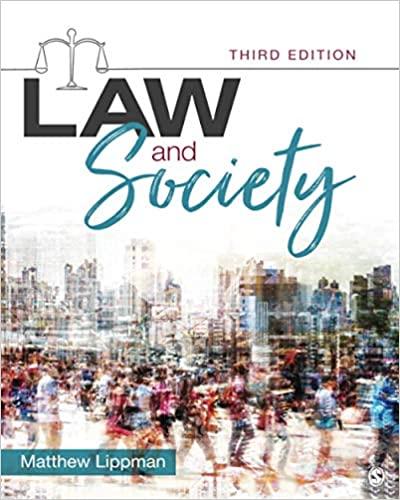Question
1.In order to establish a claim for negligence, the plaintiff must prove all but which of the following? Multiple Choice A The defendant breached the
1.In order to establish a claim for negligence, the plaintiff must prove all but which of the following?
Multiple Choice
A The defendant breached the duty.
B The plaintiff acted reasonably.
C The plaintiff sustained damages.
D The defendant was the cause of the injury.
E The plaintiff was owed a duty.
What does the so called public disclosure or "television test" mean in regard to ethical considerations?
Multiple Choice
- It requires that actions be discussed with local officials before any action is taken.
- It asks us to consult with the public before any major industry decision is made.
- It suggests that we interact with other people in a manner consistent with the way we would like for them to interact with us.
- It asks us to consider what the world would be like if our decision was copied by everyone else.
- It requires us to imagine that our actions are being broadcast on national television.
If a corporation is being sued by an individual, where is the corporation's residence considered to be?
Multiple Choice
- The state of incorporation only or the plaintiff's home state
- The state where the largest amount of the corporation's employees work
- Any state in which the individual wishes to bring the lawsuit because most corporations do business in every state via the internet
- Any state in which the corporation does business
- The state in which the corporation has its principal place of business or the state of incorporation
A search is unreasonable if the government official conducting the search does not first obtain a _____ from a court.
Multiple Choice
- subpoenaduces tecum
- writ ofhabeas corpus
- court order
- search warrant
- subpoena
To determine whether Congress intended to provide exclusive regulation in a certain area, what will courts look to?
Multiple Choice
- The Due Process Clause of the Fourteenth Amendment to the U.S. Constitution
- The Privileges and Immunities Clause of the United States Constitution
- The language of the statute and transcripts of congressional hearings
- Any oral and/or written evidence that bears a rational relation to the case at hand
- The Dormant Commerce Clause of the U.S. Constitution
Which of the following is true regarding the grand jury system?
Multiple Choice
- Under the U.S. Constitution, a grand jury is required in both state and federal felony cases, but the defendant may waive his or her right to a grand jury.
- Under the U.S. Constitution, a grand jury is required in both state and federal felony cases, and the defendant may not waive his or her right to a grand jury.
- Under the U.S. Constitution, a grand jury is required in federal felony cases.
- The defendant may not waive his or her right to a grand jury.
- Under the United States Constitution, a grand jury is required in state felony cases.
Step by Step Solution
There are 3 Steps involved in it
Step: 1

Get Instant Access to Expert-Tailored Solutions
See step-by-step solutions with expert insights and AI powered tools for academic success
Step: 2

Step: 3

Ace Your Homework with AI
Get the answers you need in no time with our AI-driven, step-by-step assistance
Get Started


